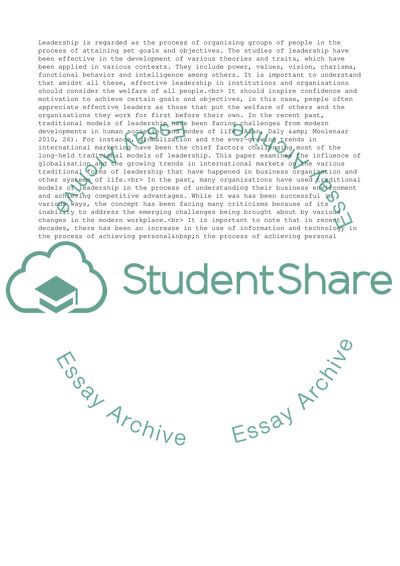Cite this document
(Traditional Models of Leadership Are Challenged in the Wake of Coursework - 1, n.d.)
Traditional Models of Leadership Are Challenged in the Wake of Coursework - 1. Retrieved from https://studentshare.org/management/1669566-traditional-models-of-leadership-are-challenged-in-the-wake-of-intensifying-globalization-and-increasing-salience-of-international-markets-critically-discuss-the-causes-of-the-contemporary-global-leadership-crisis-and-drawing-from-both-theory-and-real-l
Traditional Models of Leadership Are Challenged in the Wake of Coursework - 1. Retrieved from https://studentshare.org/management/1669566-traditional-models-of-leadership-are-challenged-in-the-wake-of-intensifying-globalization-and-increasing-salience-of-international-markets-critically-discuss-the-causes-of-the-contemporary-global-leadership-crisis-and-drawing-from-both-theory-and-real-l
(Traditional Models of Leadership Are Challenged in the Wake of Coursework - 1)
Traditional Models of Leadership Are Challenged in the Wake of Coursework - 1. https://studentshare.org/management/1669566-traditional-models-of-leadership-are-challenged-in-the-wake-of-intensifying-globalization-and-increasing-salience-of-international-markets-critically-discuss-the-causes-of-the-contemporary-global-leadership-crisis-and-drawing-from-both-theory-and-real-l.
Traditional Models of Leadership Are Challenged in the Wake of Coursework - 1. https://studentshare.org/management/1669566-traditional-models-of-leadership-are-challenged-in-the-wake-of-intensifying-globalization-and-increasing-salience-of-international-markets-critically-discuss-the-causes-of-the-contemporary-global-leadership-crisis-and-drawing-from-both-theory-and-real-l.
“Traditional Models of Leadership Are Challenged in the Wake of Coursework - 1”, n.d. https://studentshare.org/management/1669566-traditional-models-of-leadership-are-challenged-in-the-wake-of-intensifying-globalization-and-increasing-salience-of-international-markets-critically-discuss-the-causes-of-the-contemporary-global-leadership-crisis-and-drawing-from-both-theory-and-real-l.


